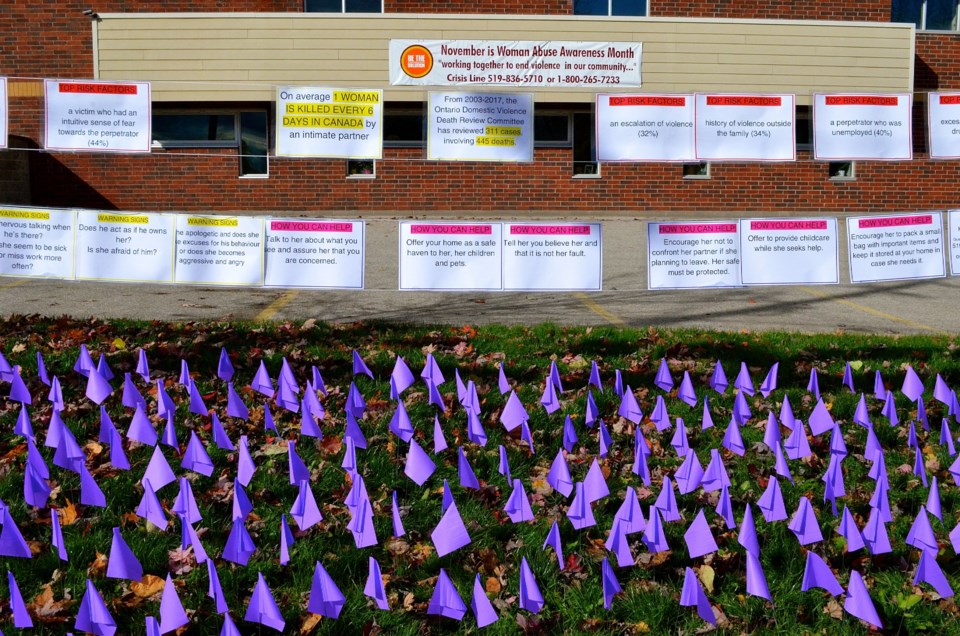It happens behind closed doors daily, it's only getting worse during the pandemic and it’s just not taken seriously enough, says Joanne Young Evans about domestic violence.
Young Evans, executive director of Family Counselling and Support Services for Guelph-Wellington, has been dealing with mental health support in Wellington County for six years. Recently, she’s been seeing cases of domestic violence against women on a weekly basis.
“I'm burnt out,” said Young Evans “This just goes on and on and on and on, it just doesn't go away, but nobody ever talks about it.
“I get upset because I see everything that's being done, and everything that's being talked about and all of the marches. This is ongoing, unfortunately, something ongoing that we have to do. We always have to push forward, we always have to make sure that we're doing the best that we can."
Young Evans refers to the recent tragedies that have taken place in the past year alone where it took a horrendous incident for people to take notice of the crisis that were affecting communities long before organizations began to take action such as the George Floyd incident, the Kamloops incident and the most recent Muslim family killed in London.
According to the Canadian Women’s Foundation, a woman in Canada is killed by an intimate partner every six days and Indigenous women are killed at six times the rate of non-Indigenous women.
It also costs governments and taxpayers $7.4 billion to deal with the aftermath of spousal violence alone leaving children in those homes with psychiatric disorders.
“Domestic violence has not decreased in well over a decade. And nobody gets up in parliament and screams about that. Nobody does marches down the street, about that,” said Young Evans.
She said we can learn from looking at the recent injustices that have taken place because we know what the root of the problem is.
Just like racist people are not born racist, people aren’t born to abuse their partners. It’s something they learn she said.
“It's getting to the youth to break the cycle,” she said, highlighting that it becomes difficult for an older person to change their perceptions of certain issues they’ve been taught at a young age.
She said she’s been unable to get funds to create programs to work with youth that would break the cycle of violence and abuse right at the root.
“And that's where we've got to start,” said Young-Evans.
She said Women-In-Crisis shelters across Ontario do incredible work but violence against women will continue to occur and women will continue to die.
“Women will continue to be abused until we get to the root of the problem. The root of the problem is the partners, and many partners were raised in homes where abuse was. That was the standard. They were never given good role models. They weren't given ways to handle anger or emotional rage those kinds of things.They were never given the tools on how to how to deal with it,” said Young-Evans.
She said only creating programs to help the women is like a Band-Aid solution to the problem.
She said FCSSGW is seeing more child abuse cases than it ever has as well. In her six years with the organization, she said the staff has always been oversubscribed to violence against women cases in contrast to other mental health supports across Guelph and Wellington County.
“We're always well over our targets for how many women, we need to see,” said Young Evans.
“It doesn't stop, and the demand is ever increasing. And we can keep throwing money at it, it's like health care, we keep throwing money to the reactive rather than the proactive, We need prevention.,” said Young Evans.
She gives the example of Rowan House Society’s Safe at Home in Alberta, a program that takes a creative approach to prevent violence against women by removing the men out of the abusive homes and putting them in a counselling program.
"You're dealing with the man because he's the one who's got the issues and helping him," said Young Evans.
She said the FCSSGW has also been running pilots on couples' counselling that has not been permanently funded across the province but is working.
She said when working with youth, she hears them say things like ‘no one's ever listened to me before,’ ‘no one's ever asked me what I want it to eat,’ ‘ no one's ever taught me how to deal with my anger and get my frustration out,’ ‘no one's ever taught me right.’
“We’ve got to get to the root of all this," Young Evans said.
